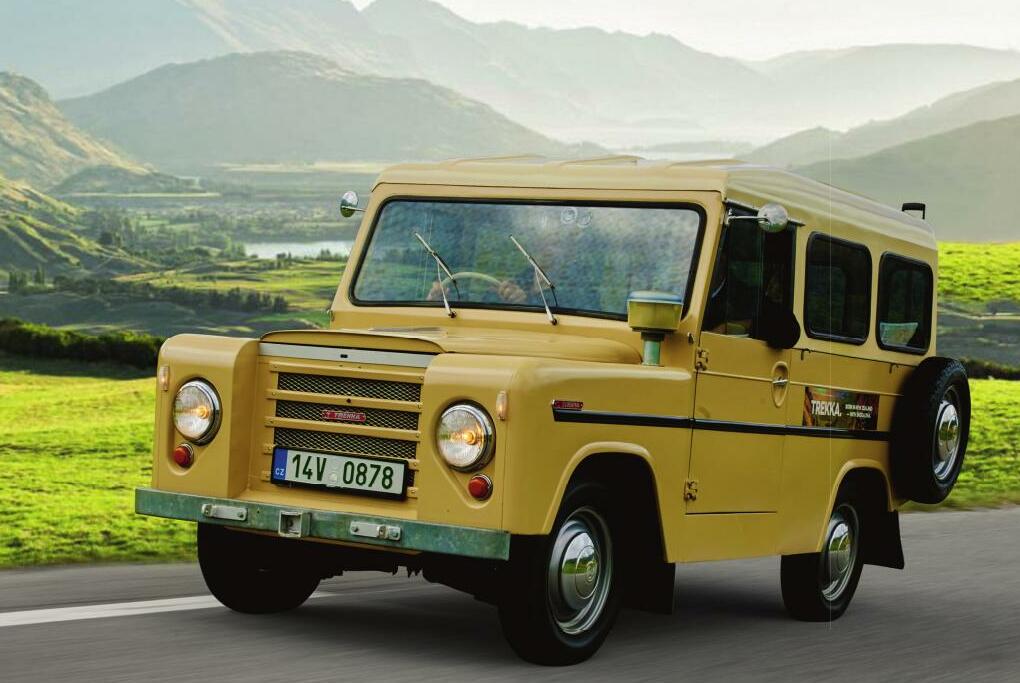A long Trekka north

When Petr Beneda drove his boxy antipodean ute onto the service station forecourt in the Czech town of Bakov nad Jizerou, the attendant already knew what it was. "Is that farm vehicle from Australia or New Zealand?" he picked correctly, falling short of knowing the Trekka marque and that only its badge was made in Australia; the rest was made in Aotearoa.
That awareness highlights the extraordinary rise in prominence in the Czech Republic of a vehicle significantly forgotten and still mocked in the country that built it. Nearly six decades earlier, the Trekka first rolled off the assembly line in Ōtāhuhu, Auckland.
In December 1966, the Trekka became New Zealand's first and only home-designed and mass-produced motor vehicle. A total of 2500 examples of it were built over six years. The boxy Trekka looked a bit like an undernourished Land Rover and featured a locally designed and built body fitted to the chassis and underpinnings of a Škoda Octavia.
A rough concept vehicle had been built by Palmerston North Škoda importer Phil Andrews. That was bought, along with the Škoda franchise, by Auckland car assembler Motor Holdings, which put it in production in Ōtāhuhu.
It was the ultimate expression of government policies to restrict imports through a comprehensive licensing system and to incentivise the local car assembly industry by loosening import restrictions for vehicles with a high local content, such as glass, upholstery, and so on.
It was the marriage of Kiwi industrial can-do with Cold War-era Czechoslovakia that lies behind the Trekka's rise to fame in Škoda's homeland over the past five years.
Škoda, whose car-making reaches back to 1905, was first proud of and then indifferent to its 1960s and 70s foray into New Zealand, but in recent years has reconnected with that chapter in its history and its global public relations potential in the 21st century.
この記事は New Zealand Listener の May 18-24, 2024 版に掲載されています。
7 日間の Magzter GOLD 無料トライアルを開始して、何千もの厳選されたプレミアム ストーリー、9,500 以上の雑誌や新聞にアクセスしてください。
すでに購読者です ? サインイン
この記事は New Zealand Listener の May 18-24, 2024 版に掲載されています。
7 日間の Magzter GOLD 無料トライアルを開始して、何千もの厳選されたプレミアム ストーリー、9,500 以上の雑誌や新聞にアクセスしてください。
すでに購読者です? サインイン

Behind the curtain
Jacinda Ardern's memoir lets us into the mind of a PM under crisis, but says less on whether she made right calls elsewhere.

Learning to swim
At 80, one of our most celebrated authors, Witi Ihimaera, threw himself in the deep end: a year-long commitment to a full-time Māori language immersion class.

Wing and a prayer
It was a winter Sunday in 1983 above a seething Wellington sea when Robert Muldoon glanced up from The Economist magazine.

The new old thing
Music from a pair of 60-somethings proves as vital as ever.

Love my way
The new series of Brokenwood Mysteries kicks off with an obsessed fan and a certain doctor living out his pop-star fantasies.

Defying gravity
EM Forster appears never to have seen a flying fish, but if he had, he might have recognised the way they inhabit two worlds. BY MATT VANCE

Lest we forget
In 1975, Frances Palmer was in Vietnam dealing with the fallout of war. Fifty years on, she asks why the lessons of war have still not been learnt.

Political overreach
The courts and judges have come in for criticism of late. Roger Partridge of the New Zealand Initiative was critical late last year of recent decisions of the Supreme Court in a lengthy paper entitled “Who makes the law?” - the obvious answer being Parliament.

Speed rules
All over Auckland, on more than 1500 local streets, new signs have been appearing.

Transparency in transit
Two recent court rulings in Europe practically caused oxygen masks to appear before air travellers, such was the shock they caused.
